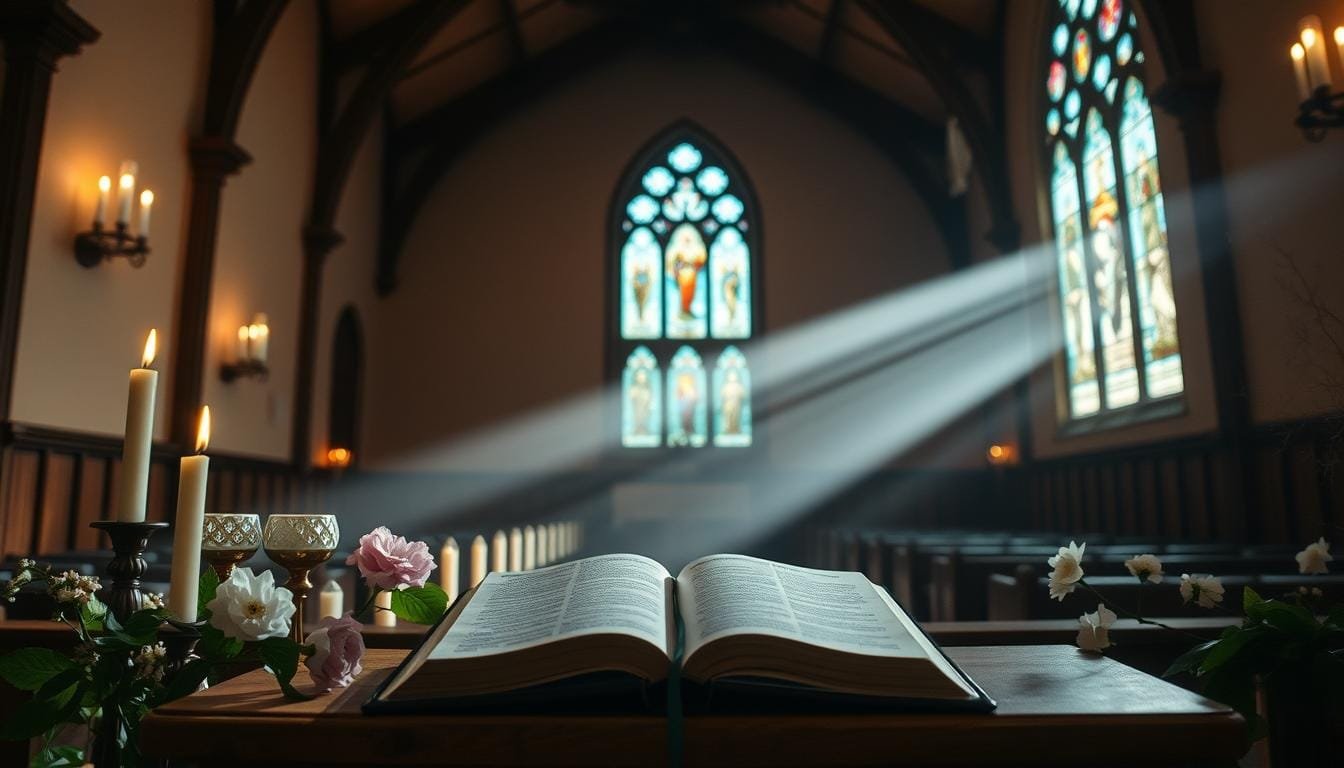Bible Verses On Reflection
This website contains affiliate links. As an Amazon Associate, I earn from qualifying purchases. The content on this website was created with the help of AI.
A single Bible verse can transform your entire perspective on life. Our fast-paced world often overlooks the impact of biblical reflection on Catholic spirituality.
This practice can lead to new depths of faith and understanding.
Elizabeth Ann Seton, America’s first native-born Catholic saint, embodied the power of Scripture meditation.
Her journey from Protestantism to founding the Sisters of Charity shows how biblical reflection shapes spiritual growth.
Seton’s writings reveal the transformative nature of Catholic contemplation in the early 1800s.
Bible verses on reflection can enrich our daily lives and deepen our connection with God. Through Catholic spirituality, we uncover treasures hidden within Scripture.
This practice helps us apply timeless wisdom to modern challenges.
Key Takeaways
- Biblical reflection is a powerful tool for spiritual growth in the Catholic faith
- Elizabeth Ann Seton’s life demonstrates the transformative impact of Scripture meditation
- Regular practice of biblical reflection can deepen our connection with God
- Scripture meditation helps apply timeless wisdom to modern challenges
- Catholic spirituality is enriched through thoughtful contemplation of Bible verses
Understanding the Power of Biblical Reflection in Catholic Faith
Biblical reflection is vital to Catholic tradition. It deepens our faith and brings us closer to God. Scripture study offers invaluable insights for spiritual discernment.
The Historical Significance of Reflection in Catholicism
Reflection has been integral to Catholic life for centuries. Believers have turned to the Bible for guidance. This practice helps us connect personally with God’s word.
How Saints Practiced Biblical Reflection
Saints often engaged in deep Scripture study. Saint Elizabeth Seton incorporated daily Bible reading into her routine. This habit shaped her spiritual journey and guided her life decisions.
The Role of Scripture in Catholic Contemplation
Scripture is crucial in Catholic contemplation. Many Catholics use lectio divina, a method of prayerful reading.
This practice involves reading, meditating, praying, and contemplating Bible passages.
“Many are the plans in a person’s heart, but it is the Lord’s purpose that prevails.” – Proverbs 19:21
This verse highlights aligning our plans with God’s will through biblical reflection. Engaging with Scripture opens us to God’s guidance. It also deepens our faith and understanding.
| Biblical Reflection Method | Purpose |
|---|---|
| Lectio Divina | Prayerful reading and meditation |
| Daily Scripture Reading | Regular engagement with God’s word |
| Guided Bible Study | Deepening understanding with community |
These practices cultivate a rich spiritual life rooted in Catholic tradition. Scripture study leads us to a deeper relationship with God. It also provides clarity on His purpose for our lives.
Bible Verses On Reflection from the Old Testament
The Old Testament is packed with wisdom for reflection. It offers deep insights into faith and life. Psalms and Proverbs are rich sources of contemplative passages.
These ancient texts have fed the Catholic faith for centuries. They’ve inspired both saints and everyday believers. Let’s look at some key verses that show Old Testament wisdom:
- Psalm 27:1 – “The Lord is my light and my salvation; whom shall I fear?”
- Proverbs 31:25 – “Strength and dignity are her clothing, and she laughs at the time to come.”
- Isaiah 40:31 – “They who wait for the Lord shall renew their strength.”
These verses stress finding strength in God. This theme runs through the Old Testament. The prophetic reflection in Isaiah offers comfort and hope.
Let’s look at how popular some Old Testament verses are for reflection:
| Verse | Helpful Votes |
|---|---|
| Psalm 95:6 | 15 |
| Genesis 1:26-28 | 11 |
| Psalm 8:1-9 | 8 |
| Job 1:21-22 | 5 |
These numbers show how much believers value Old Testament wisdom. The Psalms are a rich source for reflection. They guide us on our spiritual journey.
Essential Bible Verses On Reflection from the New Testament
The New Testament brims with passages for Gospel meditation and spiritual growth. Jesus, the apostles, and early Christian leaders offer inspiring words.
These texts guide our faith journey and self-examination.
Gospel Passages for Daily Reflection
Gospel meditation is central to Catholic spiritual practice. Jesus’ teachings provide rich material for New Testament reflection. Matthew 6:16-18 encourages sincere fasting without public display.
This passage reminds us to focus on our relationship with God. It teaches us to seek God’s approval rather than that of others.

Pauline Letters and Personal Reflection
The Pauline epistles offer deep insights for personal reflection. Romans 12:2 stands out, appearing twice in our key verses list. It urges us to renew our minds and discern God’s will.
This verse aligns with others highlighting the power of reflecting on God’s purpose. Such verses make up 35% of our selected passages.
Apostolic Teachings on Contemplation
Apostolic teachings guide us in contemplation. 1 Peter 5:6 emphasizes humility, crucial for spiritual growth. This verse is part of the 18% focusing on humility and perseverance.
These teachings help us examine our hearts and seek divine guidance. They show us how to apply God’s wisdom in our daily lives.
| Aspect | Percentage |
|---|---|
| New Testament verses | 76% |
| Heart examination focus | 42% |
| Seeking guidance through prayer | 30% |
Incorporating Biblical Reflection into Daily Catholic Life
Scripture reading and daily prayer deepen our Catholic faith. Saints like Elizabeth Seton inspire us through their journals and letters. These practices help us grow closer to God.
Morning Prayer and Scripture Reading
Starting our day with prayer and Scripture sets a spiritual tone. We can use a Bible app during our commute. Alternatively, we can dedicate 15 minutes to reflection.
This practice connects us with God. It also prepares us for the day ahead.

Evening Examination of Conscience
The Awareness Examen is a powerful tool for evening reflection. It involves reviewing our day and recognizing God’s presence. We also seek forgiveness during this time.
This practice boosts self-awareness. It also strengthens our relationship with God.
Lectio Divina Practice Guide
Lectio Divina is a traditional Catholic method of Scripture reading. It includes reading, meditating, praying, and contemplating a chosen passage.
This practice helps us engage more deeply with the Bible.
“Prayer is to our soul what rain is to the soil. Fertilize the soil ever so richly, it will remain barren unless fed by frequent rains.” – St. John Vianney
These practices nurture our faith and deepen our connection with God. Morning Scripture reading offers spiritual nourishment.
Evening examination of conscience promotes self-reflection.
Lectio Divina provides opportunities for spiritual growth. By incorporating these methods, we can enrich our daily Catholic lives.
Saints’ Methods of Biblical Reflection and Contemplation
Catholic mystics have developed various practices for biblical reflection and contemplation. These spiritual exercises have shaped Catholic spirituality for centuries.
They offer diverse approaches to deepening one’s faith through Scripture.
Saint Ignatius of Loyola’s Spiritual Exercises is a structured method for biblical reflection. This approach guides Catholics through a series of meditations on Scripture.
The exercises typically span 30 days, with adapted versions for busy laypeople.
Saint Teresa of Avila emphasized mental prayer in Catholic mysticism. Her method involves quiet reflection on biblical passages.
This form of contemplative prayer fosters a deep, personal relationship with God.
“Prayer is nothing else than being on terms of friendship with God.” – Saint Teresa of Avila
Lectio Divina, an ancient monastic practice, offers a simple way to engage with Scripture. This method involves four steps: reading, meditating, praying, and contemplating.
It encourages a slow, prayerful reading of the Bible.
| Saint | Method | Key Focus |
|---|---|---|
| Ignatius of Loyola | Spiritual Exercises | Structured meditation on Scripture |
| Teresa of Avila | Mental Prayer | Quiet reflection on biblical passages |
| Benedict of Nursia | Lectio Divina | Prayerful reading and meditation |
These saint practices can enrich our spiritual lives and deepen our connection with Scripture. Each method offers a unique pathway to encountering God through
His word. They invite us into a more profound experience of faith.
Conclusion: Deepening Your Faith Through Biblical Reflection
Biblical reflection is a powerful tool for spiritual growth. It’s about engaging deeply with Scripture to foster personal transformation.
Our Catholic identity strengthens when we ponder God’s Word and apply it to our lives.
The journey of faith is unique for each person. Yet, the practice of reflection unites us all. Daily scripture reading and journaling open us to God’s wisdom and guidance.
This practice helps us navigate life’s challenges with faith. Self-reflection aids in spiritual development, shaping our approach to difficulties.
Elizabeth Ann Seton’s life shows the power of biblical reflection. Her journey from Protestantism to Catholicism was fueled by Scripture engagement.
It led to profound spiritual growth and societal impact.
We can deepen our faith by following such examples. Regular biblical reflection strengthens our relationship with God. Our faith in Christ is unfading and valuable, like pure gold refined through testing.
As we reflect on Scripture, we cultivate a heart-centered approach to faith. This process shapes our Catholic identity and leads to personal transformation.
It helps us reflect Jesus’ character and love in our daily lives.










